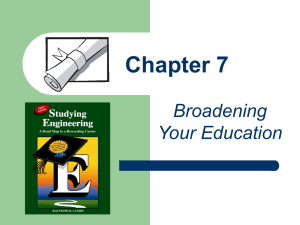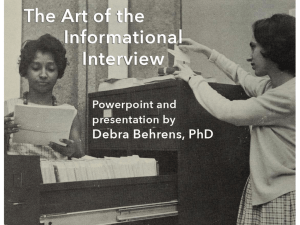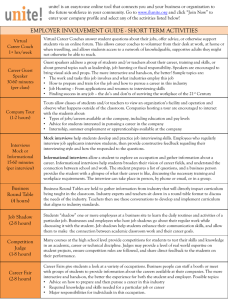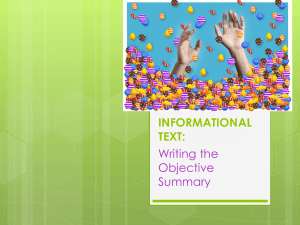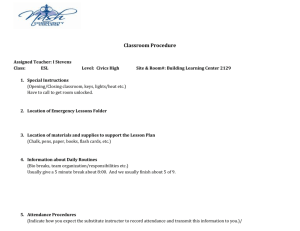Informational Interviewing - UCSF Career & Professional Development
advertisement
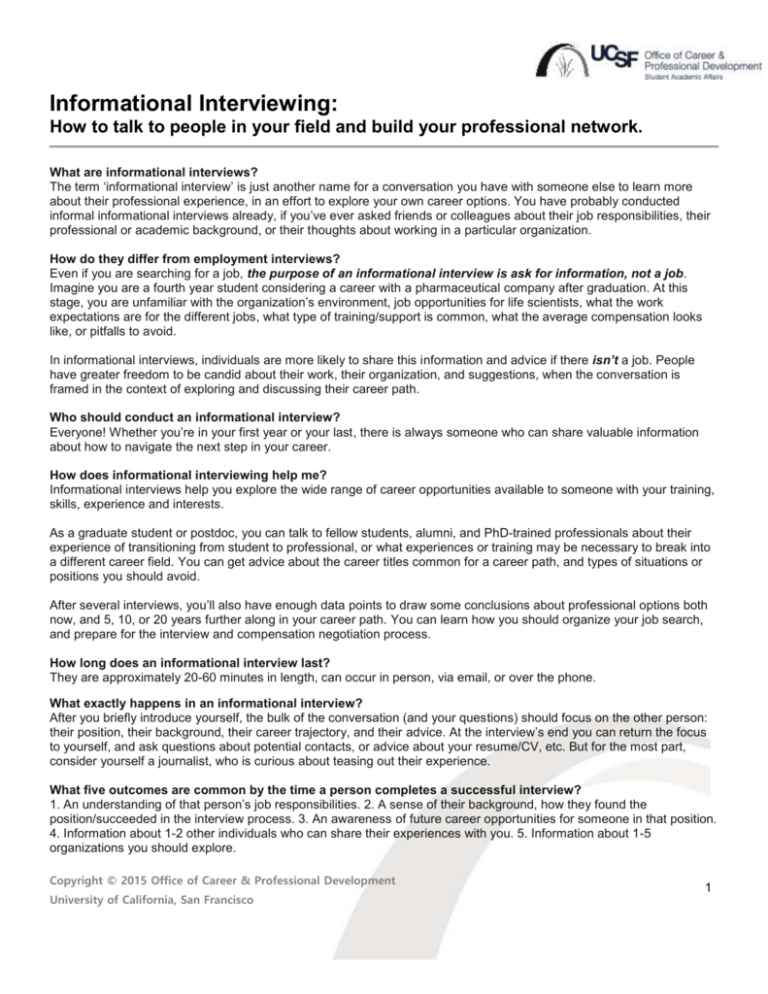
Informational Interviewing: How to talk to people in your field and build your professional network. What are informational interviews? The term ‘informational interview’ is just another name for a conversation you have with someone else to learn more about their professional experience, in an effort to explore your own career options. You have probably conducted informal informational interviews already, if you’ve ever asked friends or colleagues about their job responsibilities, their professional or academic background, or their thoughts about working in a particular organization. How do they differ from employment interviews? Even if you are searching for a job, the purpose of an informational interview is ask for information, not a job. Imagine you are a fourth year student considering a career with a pharmaceutical company after graduation. At this stage, you are unfamiliar with the organization’s environment, job opportunities for life scientists, what the work expectations are for the different jobs, what type of training/support is common, what the average compensation looks like, or pitfalls to avoid. In informational interviews, individuals are more likely to share this information and advice if there isn’t a job. People have greater freedom to be candid about their work, their organization, and suggestions, when the conversation is framed in the context of exploring and discussing their career path. Who should conduct an informational interview? Everyone! Whether you’re in your first year or your last, there is always someone who can share valuable information about how to navigate the next step in your career. How does informational interviewing help me? Informational interviews help you explore the wide range of career opportunities available to someone with your training, skills, experience and interests. As a graduate student or postdoc, you can talk to fellow students, alumni, and PhD-trained professionals about their experience of transitioning from student to professional, or what experiences or training may be necessary to break into a different career field. You can get advice about the career titles common for a career path, and types of situations or positions you should avoid. After several interviews, you’ll also have enough data points to draw some conclusions about professional options both now, and 5, 10, or 20 years further along in your career path. You can learn how you should organize your job search, and prepare for the interview and compensation negotiation process. How long does an informational interview last? They are approximately 20-60 minutes in length, can occur in person, via email, or over the phone. 2 of 4] What exactly happens in an informational interview? After you briefly introduce yourself, the bulk of the conversation (and your questions) should focus on the other person: their position, their background, their career trajectory, and their advice. At the interview’s end you can return the focus to yourself, and ask questions about potential contacts, or advice about your resume/CV, etc. But for the most part, consider yourself a journalist, who is curious about teasing out their experience. What five outcomes are common by the time a person completes a successful interview? 1. An understanding of that person’s job responsibilities. 2. A sense of their background, how they found the position/succeeded in the interview process. 3. An awareness of future career opportunities for someone in that position. 4. Information about 1-2 other individuals who can share their experiences with you. 5. Information about 1-5 organizations you should explore. Copyright © 2015 Office of Career & Professional Development University of California, San Francisco 1 What is the arc and format of an interview? Informational interviews cover 4 areas: The present, past, future and advice. So if you had 30 minutes, you might ask 610 questions in total. A sample format might be: Focus A. Their Present Length of time 10 minutes Topics you can ask about B. Their Past 5-6 minutes C. Their Future 5-6 minutes What type of opportunities could open up 5-10 years in the future D. Their Advice 5 minutes What individuals and organizations do they suggest you connect with. Critique of your resume/CV Resources/activities to pursue if you want to go into the field. Information about their current responsibilities. Information about the organization they work for. Information about their academic and professional background. How they found the job. What the interview process was like. If they weren’t in this job, what job they would like. With whom should I conduct an informational interview? Anyone who you feel could give you another perspective or good advice. This includes fellow students, alumni, senior professionals in your area of specialty, individuals who are working in positions of interest to you, or someone who works at an organization of interest to you (in any position). What is a typical informational interview process entail? 1. Email the contact and ask to set a time to talk 2. Tell them you’re beginning to think about “making a career path change into x (the career path they are in)” 3. Tell them you’re “only seeking advice and opinions on (their) field and (their) industry” 4. Let them know you’ll be “brief, structured”; offer to buy coffee/lunch 5. Use the following Informational Interview Questions 6. Take notes; try to leave each session with an additional contact 7. Email a thank-you note later 8. Keep your contacts updated on your job search or other progress How do I ask someone to do an informational interview? You can approach via email, by phone, or in person. Often it helps to first send an email and then follow up by phone. Your correspondence might state: Subject line for email: Frida Kahlo suggested I contact you. Dear Dr. Rivera, I recently spoke with Frida Kahlo, who suggested that I contact you. I am a third-year graduate student at UCSF, and for the past few months have been speaking with a number of researchers about their experience. Frida briefly mentioned that you also considered industry postdocs that were a good match for your career path in the pharmaceutical industry, and thought that you could share some valuable advice on the subject. Would it be possible for us to meet for perhaps half an hour? I would appreciate hearing about your current position at Merck, postdoc experience at Novartis, and any advice you might have for a student. Regards, Pablo Picasso For more examples, look at the samples on the OCPD website. Copyright © 2015 Office of Career & Professional Development University of California, San Francisco 2 Informational I nterviewing How might I begin an informational interview? Your conversation would begin by mimicking the language of your initial approach, whether it was an email or in-person request. The point is to take 60 seconds to set the agenda for the person. For example: “Thank you so much for speaking with me. Let me tell you a little bit about why I asked for this half hour of your time. As I shared in my email, I’m currently completing my PhD at UCSF and am considering the next stage in my career. For the past two months, I’ve been speaking to as many industry scientists as possible about their positions, to learn more about opportunities in the field.” “Can you begin by sharing a little bit about your role as Director of Research, and what you enjoy about your position?” What are some appropriate and effective questions to ask? A. Questions about the person’s present professional experience: 1. Can you tell me a little bit about your current responsibilities? 2. Could you describe a typical day/week? 3. With whom do you primarily interact? 4. What types of skills and experiences are key to be qualified for your position? 5. What are common qualities of individuals who are successful in your position? 6. What makes this organization a particularly good place to work? 7. What is most challenging/unexpected about working in this position? 8. How would you describe/what do you like about your work environment? 9. How would you describe the culture, management style and organization here? 10. What is your understanding of the average starting salary range in R&D for those with a PhD degree? B. Questions about the person’s past professional experience: 1. How did you get into this field? What path led you to this position? 2. How did you organize your job search? 3. What was your interview process/job talk like? 4. What’s been particularly rewarding about the path you have taken? 5. What would you do differently? 6. When you think about your first year in this position, what actions/activities were key towards your success (engaging other staff, setting expectations, work/life balance, etc.) 7. What type of orientation/training did you receive when you first began working here? 8. Was there anything you wish had been included in that training? C. Questions about the person’s professional future: 1. What are some future career paths that open up for some in your position 5 or 10 years down the road? 2. What would be a professionally interesting next step in your career? D. General excellent advice: 1. What advice would you give someone in my position who wants to be successful in the field? 2. What would you advise new grads about things to look for in terms of orientation, support, work load, etc? 3. Looking back on your interview, what questions do you suggest candidates ask before taking a position? What do they need to know? 4. I have a copy of my resume/CV. Could you look at it and let me know your thoughts? 5. From the research and informational interviews I’ve done so far, I’ve developed a list of organizations that I am interested in. Can you tell me anything about them? Are there organizations I’ve left off that I should look at more closely? 6. Can you recommend anyone else who might be willing to talk with me about their career path, either with a background or interest similar to mine (in terms of interest, research area, etc.), or who works at one of the organizations I mentioned? Copyright © 2015 Office of Career & Professional Development University of California, San Francisco 3 Informational Interviewing What do I do to close the interview? At the end, thank the person for their time and advice, and be specific about what you found valuable. Also ask to keep in touch. A final statement could be something like: “Thank you so much for sharing your perspective and background. I appreciate you taking the time. I have found your advice about preparing for an interview and suggestions for my resume very helpful. Thank you also for directing me towards Kofi Annan at Genentech. I’ll contact him in the next week.” “May I have your business card? I’d like to keep in touch with you as I move forward in this process. And if I can ever return the favor, please don’t hesitate to contact me.” What two things should I do after the interview? 1. Remember to write and send a thank you note in 24-48 hours! You are building your professional network. There are sample thank you notes on the OCPD website. 2. Keep in touch! Send a follow up email a few weeks later touch base. If they suggested that you contact someone, let them know when you do and why it was valuable. If they suggest that you alter your resume, or ask a particular interview question at an employment interview, and you found the advice useful, thank them for that as well. What would I include in a thank you note? The note is a brief (6 lines at most!) statement once again thanking them for their time, additional reflections about what you appreciated, and a request to keep in touch. A sample letter might look like: Subject line (if email): Thank you so much for our conversation this week. Dear Dr. Mozart, wanted to write you a quick note to thank you again for the opportunity to speak with you about your experience as an Editor at PLOS . After our conversation I have a much better sense of the rewards and challenges of working at a scientific journal. As you suggested, I will get in touch with Scott Joplin at AAAS next week. I greatly appreciate your time and do hope to keep in touch as I go through my job search next year. Please let me know if I can ever be of service to you. Warm regards, Aaron Copland Should I write a handwritten note or email my thank you? Actually, either is a nice gesture, and both are appropriate - consider if your recipient seems to prefer hand- written correspondence, or is comfortable with email. And informational interviewing could lead to a job.... ...because you’re basically networking. Keep in mind that you’re building your network to gather information, but before you need the job. If you conduct a series of informational interviews during your time at UCSF, all of these individuals will serve as your network when you really are on the market. By then, they will have met you, and probably be more responsive to your later requests to think of them if a position becomes available. So as a student or postdoc, when should I begin informational interviewing? Consider beginning informational interviewing after your second year, or as late as 3 months before graduation. Perhaps conduct one interview a quarter with people you meet at conferences, professional meetings, or through recommendations of friends, advisors, mentors or colleagues. And if I have more questions about informational interviewing? Copyright © 2015 Office of Career & Professional Development University of California, San Francisco 4 If you have questions about informational interviewing in particular, or networking in general, schedule an appointment for a 1:1 consultation. To schedule an appointment, call 476.4986 or visit us at career.ucsf.edu. We can: Discuss how to build your professional network. Use the Graduate Division Career Alumni Network (GD CAN) database to connect you with alumni. Practice a mock informational interview. Help you prepare to network at a conference. Copyright © 2015 Office of Career & Professional Development University of California, San Francisco 5
